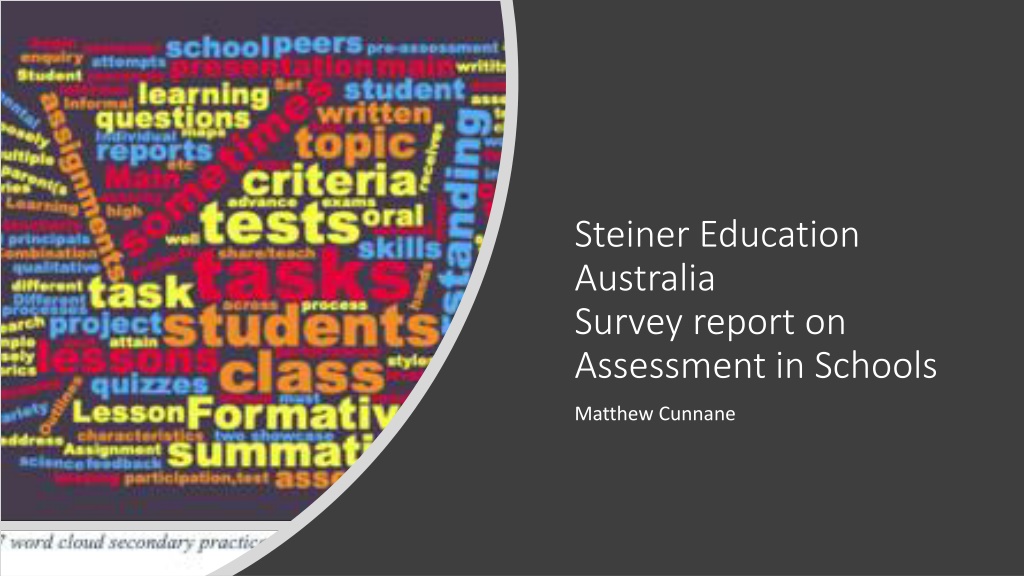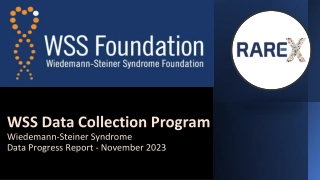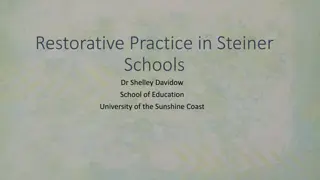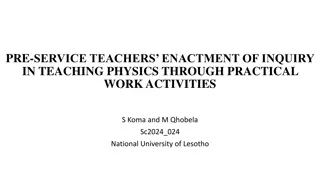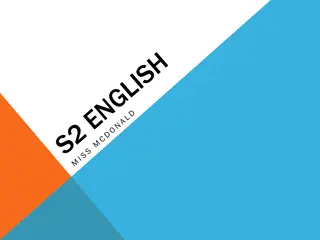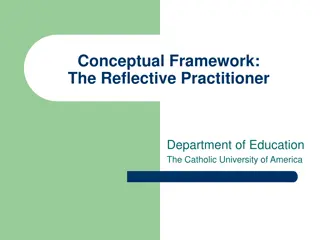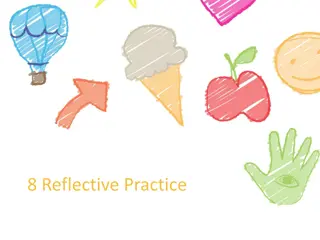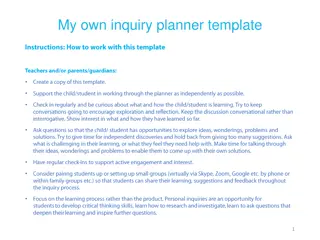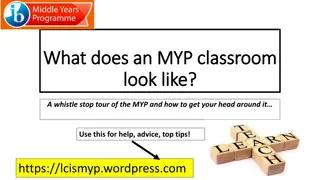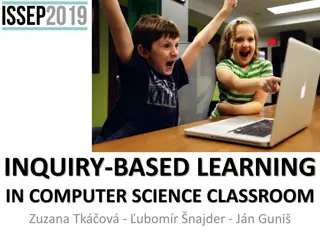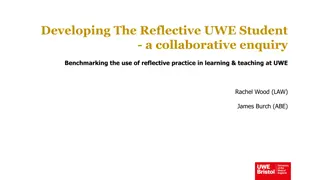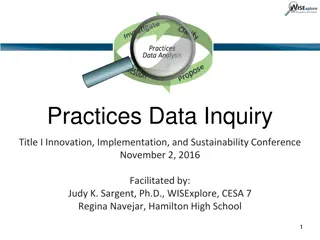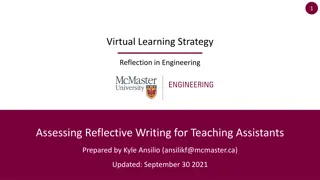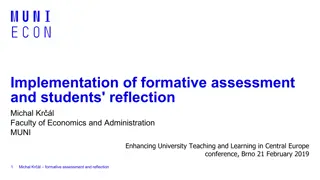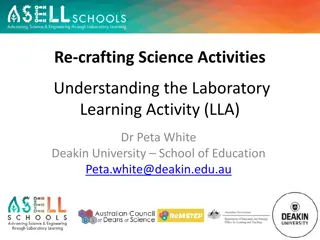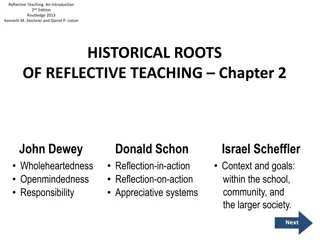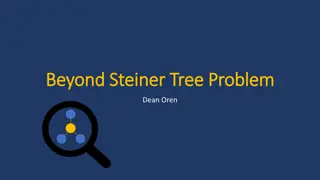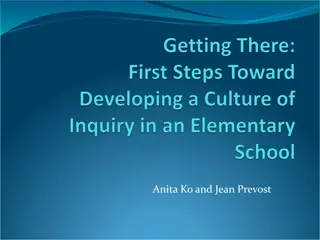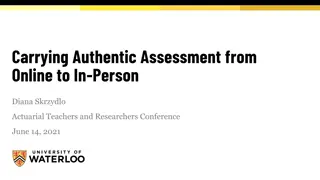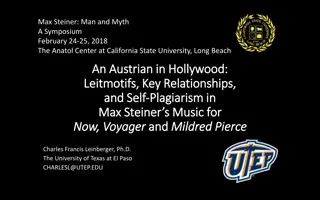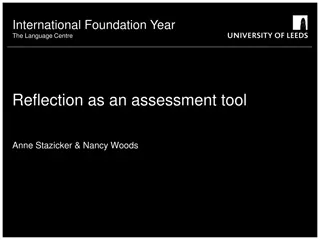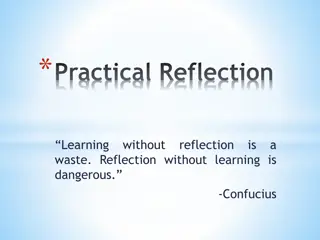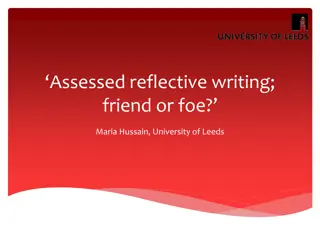Exploring Assessment Practices in Steiner Education: A Reflective Inquiry
Delve into the intricate relationship teachers have with assessment in Steiner schools, examining the purpose and life it brings to the educational setting. Understand the pivotal role of school leaders in shaping assessment practices and discover the true essence of assessment in the context of Steiner Education today.
Download Presentation

Please find below an Image/Link to download the presentation.
The content on the website is provided AS IS for your information and personal use only. It may not be sold, licensed, or shared on other websites without obtaining consent from the author. Download presentation by click this link. If you encounter any issues during the download, it is possible that the publisher has removed the file from their server.
E N D
Presentation Transcript
Steiner Education Australia Survey report on Assessment in Schools Matthew Cunnane
1 minute Brainstorm word association on Assessment
Broadly speaking, how would you describe the typical relationship (thoughts, feelings, and activity) teachers in your school have with assessing?
How would you describe the relationship assessment practices have to purpose and life of your school?
As a school leader what does your participation in assessment practices look like?
What would you say is the true purpose and role of assessment in your school?
Finally, (given the above) what does assessment mean in your school?
Reflective check in note those elements resonating in your consciousness
Assessment within Steiner Education today
We have this. We have this. Traditional Triangle of Learning This is missing so we have to construct it!
Formative When the purpose is to improve student learning For Learning Equates to formative assessment Problems with definitions Problems with Purpose Of Learning Equates to summative assessment Summative When the purpose is to determine where someone sits against a set standard. As Learning Is student centered formative assessment
Within Steiner Education we do not have a language for assessment The understanding varies widely Typical responses included: Testing knowledge maths and english associated with: Main lesson Products Grades
Steiner Teacher Population by State/Territory NT 2% TAS 3% ACT 5% SA 7% 946 NSW 37% QLD 8% Estimated number of Teachers working in Steiner Education WA 13% ( across 47 schools) VIC 25%
Survey comparative Representation Figure 1 Teacher demographics by State
Total years in Teaching 40 35 # of respondents 30 What we know about our teachers 25 20 15 10 5 0 20+ 16 to 20 11 to 15 6 to 10 3 to 5 2 or less number of years reported fulltime part time Figure 4 years of experience as %
A typical profile of the participants The average teacher is a full-time class teacher in New south Wales with six years or more years of experience in Steiner education.
Teachers reported relationship with assessment?
Teacher Satisfaction with their assessment Figure 8 Satisfaction with assessment as %
Assessment is necessary and important Figure 9 attitude towards assessment
Reported relationship of Assessment to the life of the school?
Teachers rarely discuss assessment formally Figure 11 frequency of collegial feedback
Administration rarely inputs on teachers assessment practices Figure 13 administrative feedback
Getting feedback on assessment is rare Figure 12 Professional Feedback on assessment
How do we go about assessing students?
The majority of teachers did not articulate a practice of assessment listing assessment tasks or purposes was the most common response Early years teachers rely almost exclusively on anecdotal observations Primary teachers rely on observation with a focus on numeracy and literacy. Secondary teachers tend to rely more on tests, quizzes and other formal tasks more than their primary school counterparts. A Typical summary
What we do use Primary common Response often often very often often often occasional seldom Secondary common response Typical tools reported to be used in Steiner schools. Participation Completion Effort Aesthetics Main Lesson Books Group Work Child Study often often often often often occasional occasional
What we do not use Primary common Response occasional never never never occasional often never often Secondary common response occasional never never never never occasional often occasional Typical tools for academic assessment Written tests (paper and pencil style) Multiple choice Matching questions True/false questions Fill in the blanks Short answer Extended answer Hands on activities for assessment
Frequency with which we use guides etc. Typical assessment methods and guides Assess for high order skills Use a rubric Validity principles for assessment task design Reliability principles for assessment task design Early average occasional occasional Primary average occasional occasional Secondary average often often seldom seldom occasional seldom seldom occasional
Teachers usually create their own assessment processes They rarely consult with each other about assessment processes They are marginally more likely to plan their lessons based on content than on student progress What can be said is Teachers typically create their own assessment processes and rubrics The rubrics they use are focussed more on a developmental paradigm. Rubric design appears to be mostly a solo activity
Some interesting tensions within the report
Teachers are typically reporting an emphasis on individual progress as their most important focus, but they are not reporting the use of standards or rubrics to guide these judgements.
Teachers are typically reporting providing high volumes of formative feedback to students but they are also reporting they only sometimes share advice on assessment and standards with students
Teachers are typically reporting frequently using student results for teaching and planning but infrequent use of assessment tasks that provide evidence.
Teachers are typically reporting capacity development as their primary focus, but numeracy and literacy as what they are assessing for.
Teachers are typically reporting that they assess for higher order skills, but using product based tools in their assessment.
Frequency of Professional Learning? Figure 15 recency of Professional Learning
Is Professional Learning Required? Figure 10 View on Professional Development
Would you welcome PL on assessment? (overall) The final question. 2% 6% unclear 30% yes implied yes no 62%
Imaginative cognition in Steiner Education a Research project
